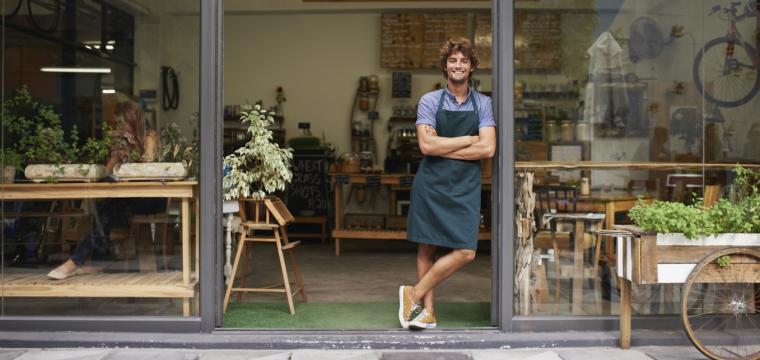Opening a new shop, whether you're starting or growing your retail business, is always an exciting time for any business owner. However, to be successful, there are lots of different factors to consider, from picking the perfect location to identifying the right marketing channels to promote your new store.
In this article, we’ll cover some of the key steps to take and provide some examples of retail businesses we’ve supported that have successfully opened a shop.
Conduct market research
A solid understanding of the market landscape and consumer behaviour is key to any successful retail venture. Conducting thorough market research will help you identify opportunities and threats when you’re preparing to open a shop.
There are lots of different methods for doing this, which fall into two main categories: primary research and secondary research. Primary research is research you do yourself, collecting information that isn’t currently available from another source, whereas secondary research is where you use existing information. It can often be useful to carry out secondary research first - for example, analysing competitor websites, market research reports, or news articles. Usually more easily accessible and low cost or free, secondary research can provide ideas and help narrow your focus before you then start collecting your own data via primary research (such as surveys and focus groups).
There are three main areas to focus on when conducting your research:
- The market – including market size, market growth, current and forecasted trends, and external forces affecting the industry (political, economic, social, technological, legal, and environmental)
- Other organisations – including competitors, suppliers, and intermediaries. Analyse your competitors’ strengths and weaknesses to determine how you can stand out and gain a competitive advantage
- Your customers – including demographic information (such as age, location, gender), psychographic information (activities, interests, values), and behavioural information (purchase history, usage habits, brand loyalty)
Write or update your business plan
With the insights gained through your market research, you can develop a business plan outlining your goals, strategies, and action plans. Regardless of whether you need to raise external finance or not, a business plan is an important tool for every business. It serves as a roadmap and provides an essential basis for making informed decisions.
Developing a business plan is not only useful if you’re starting a retail business and opening your first shop. Even if you have an established retail business with an existing plan, it’s a good idea to review and update it on a continuous basis. Market trends, competitor strategies, and customer preferences and behaviours are constantly evolving. Revisiting your business plan will help you determine whether opening a new shop is a good idea and how best to do it.
For some essential tips and a step-by-step breakdown of the different sections to include, read our guide to writing a business plan.
Select the right location
Choosing the optimal location for your new shop will play a critical part in its success. Here are a few factors to consider:
- Traffic and visibility. It’s important to note that high traffic levels don’t necessarily mean a lot of customers. You need a location that’s appealing, convenient, and easily accessible to the right type of customers. Consider the demographics and preferences of your target market, including where they live, work, or like to spend time.
- Accessibility and parking. Make sure your shop is in a convenient location for your customers, employees, and suppliers. Consider whether more customers will walk or drive past the location, if there are good public transport links and/or enough parking spaces, and whether it’s accessible for delivery vehicles.
- Competitive environment. Have a look at the surrounding businesses. Ideally, you’ll want a place where this is low competition but high demand. The presence of complementary businesses that will appeal to your target market can be beneficial too.
- Planning permission. Check what classification the building currently falls under. Whether you’re leasing or buying, you might need to get planning permission if you’re going to use the property for a different purpose than its original use.
- Affordability. Make sure to carefully check all terms of a lease and factor in all costs, from insurance and business rates to decorating and fit-out costs before you make a final decision. Don’t forget that there are flexible finance options available that could help.
John Henry Flowers is one example of a business that we supported with funding to help it open a bigger shop and expand. The company used a £15,000 loan to relocate to larger premises at Unit 10, Wellfield Court in Cardiff. Director John Sartain said: “Our landlord contacted us to explain that a larger shop in Wellfield Court was becoming available and it was ideal timing as we needed more space and wanted to take advantage of a larger shop front with more passing trade.
“We did the sums and quickly established that we needed £15,000 to fund the fit-out and give us some extra working capital to buy more stock and pay the higher rent. That might not seem like a lot of money to some business owners, but for us, we knew it would make all the difference by paying for the move and giving us room to grow. The flexible and friendly approach of the Development Bank meant that we got the exact amount that we needed, when we needed it so we’re now up and running in our new premises and we couldn’t be happier.”
Hire employees
For your retail business to thrive you’ll need to hire a strong team and make sure they’re trained on your tills and systems. Look for candidates who demonstrate a keenness to learn and will fit the sort of company culture you want to build. The importance of customer service for a retail business can’t be overstated, so give employees the training they need to be able to deliver attentive service, resolve customer concerns, and provide product recommendations where needed.
Dylan’s Den Crystal Shop, an independent crystal and giftware retail business, received a £100,000 loan from us to open a new shop. Dylan Jones said: “With a background in retail property, I understand the challenges faced by local high streets, but also recognise the valuable role that they have in communities. I believe that people still very much enjoy the shopping experience, but as a business you have to be relevant and focused on providing the right products. It is also important to provide an excellent personal customer experience that you can’t get online, which is largely perfunctory in nature. Caitlin and I believe that the foundation of our business is customer service because a delighted customer is a returning customer.”
There are various steps you need to take when hiring employees. Firstly, you should calculate how much it’ll cost and whether you can afford to do so. Once you’ve determined this, there are then legal matters to take care of, including registering as an employer and making sure you’ve got employers’ liability insurance. Find out more about what you need to do when employing staff for the first time here.
Business Wales offers a range of support and information for businesses looking to employ and train staff – you can find out more here.
Spread the word
Effective marketing will help you attract customers and keep them coming back to your shop. Refer back to your market research so that you can develop a marketing strategy with your target customers in mind, using the right channels and tactics to reach that particular audience. You may initially be able to generate some excitement about the opening of your store – for example, by using social media and posting in local community groups, or with more traditional methods like using local news outlets to spread the word.
Even if you don’t sell online, your retail business can benefit from having an online presence. Many shoppers will go online to search for shops in their area and will want to have a look at what you offer before deciding to come in-store. Having a website and social media pages can increase your visibility, strengthen your credibility, and give you more opportunities to engage with customers and build loyalty.
Get finance
The upfront costs of opening a shop can be high. Whether you’re starting a retail business or ready to take the next step to grow your business, we can provide flexible business loans to companies in Wales. If you want to find out more about the funding options we offer, don’t hesitate to get in touch.


